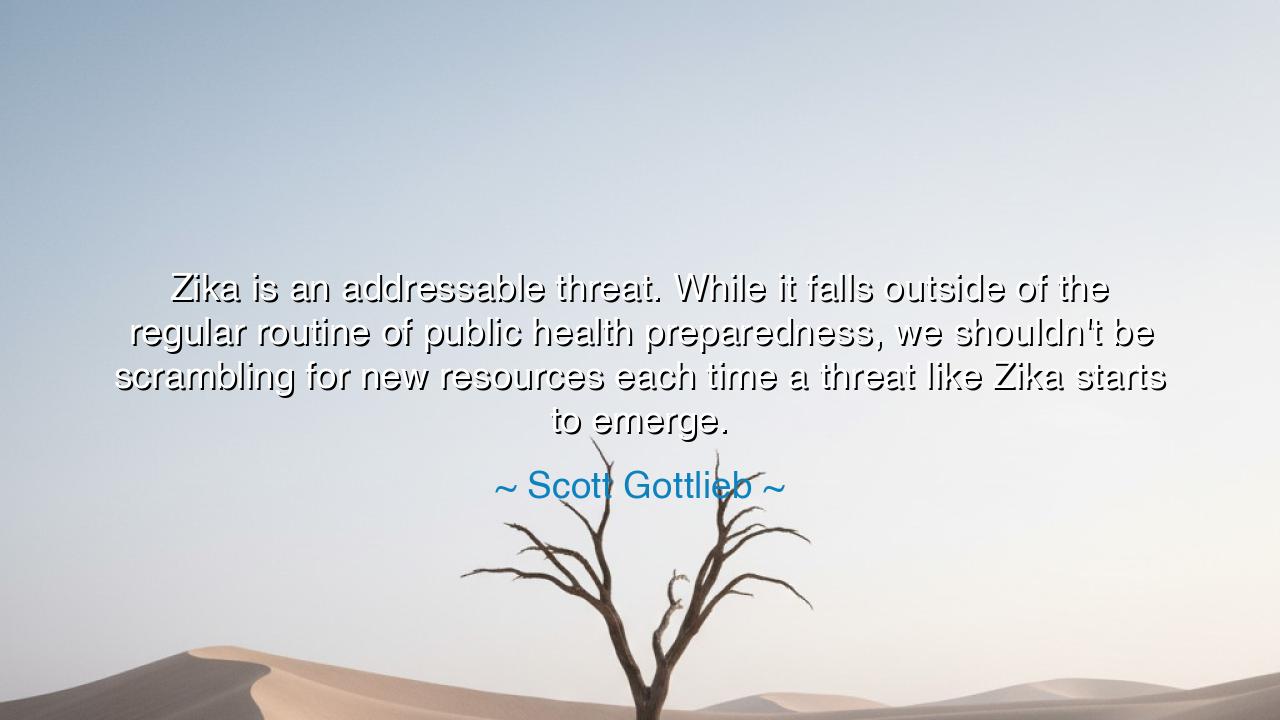
Zika is an addressable threat. While it falls outside of the
Zika is an addressable threat. While it falls outside of the regular routine of public health preparedness, we shouldn't be scrambling for new resources each time a threat like Zika starts to emerge.






In the ever-shifting landscape of human survival, Scott Gottlieb spoke with the urgency of one who sees both danger and opportunity in the same breath: “Zika is an addressable threat. While it falls outside of the regular routine of public health preparedness, we shouldn’t be scrambling for new resources each time a threat like Zika starts to emerge.” These words, though born in the modern tongue, carry the rhythm of ancient wisdom—the counsel of foresight over panic, of preparedness over fear. For what he speaks of is not merely a disease, but a pattern repeated through all of history: the blindness of man who waits for disaster before seeking wisdom.
The Zika virus, born of distant lands and carried by the hum of the mosquito’s wings, once seemed a far-off concern. But as with so many plagues before it, it crossed borders unseen and entered the homes of the unready. Mothers bore children with sorrowful afflictions; nations trembled at the unknown. Yet Gottlieb’s insight cuts deeper than the event itself. He reminds us that Zika is not unique, that it is but one face in a long lineage of emerging threats—each a test of humanity’s discipline and unity. His call is not for despair, but for structure, for systems that stand firm even when the winds of disease begin to blow.
The ancients understood this truth in their own way. When the city of Athens was struck by plague during the Peloponnesian War, its people cried out in fear, and the very fabric of their democracy unraveled. Temples overflowed with the dying, and law gave way to chaos. Yet among them was Hippocrates, who did not flee nor curse the gods, but sought patterns in the sickness. He recorded symptoms, studied transmission, and through reason laid the foundation of public health itself. His calm foresight amid terror became a torch that has guided healers for millennia. Gottlieb’s words, too, call us to that same spirit—to meet crisis not with confusion, but with preparation.
When he says “Zika is an addressable threat,” he speaks with both confidence and challenge. An addressable threat is one that can be met with wisdom—if we are ready, if we have built the foundations before the storm. Yet when he warns against “scrambling for new resources”, he laments a recurring folly: that we forget too quickly. Each generation builds systems after the last calamity, only to let them decay in the comfort of peace. This, too, is an ancient sin. The walls of Troy were said to be unbreachable, until the Trojans themselves grew complacent, leaving their gate open to deception. So too do nations leave the gates of health unguarded when vigilance grows dull.
Gottlieb’s wisdom is not about Zika alone—it is about the philosophy of governance and the stewardship of the common good. The diseases of tomorrow are already born in the shadows of today. To wait until they show their faces is to fight too late. The physician’s warning is, therefore, also a call to responsibility: to sustain investment in research, laboratories, vaccines, and education—not as reaction, but as readiness. For the cost of preparedness is small compared to the price of panic.
And yet there is a spiritual layer in his teaching as well. The lesson applies not only to nations, but to individuals. How many of us live without foresight, guarding neither our health, nor our minds, nor our hearts until misfortune forces us awake? The wise soul, like the wise society, practices readiness—building inner strength before the storm, cultivating calm before the conflict. Just as communities must plan for disease, so must we fortify our spirits against despair, our reason against fear, our compassion against division.
Therefore, let this be the lesson carried forward: Preparation is the highest form of wisdom. Whether the enemy is pestilence, poverty, or apathy, the victory belongs not to those who react swiftly, but to those who build slowly, consistently, and with vision. Do not wait for the crisis to reveal what you should have prepared in peace. Let the story of Zika, and the words of Scott Gottlieb, remind all generations that foresight is the guardian of life. For those who honor preparedness protect not only their own time, but the countless lives yet unborn.
So, take heed, children of the future: build your defenses not in fear, but in knowledge; not after the storm, but before the clouds gather. For in doing so, you honor the deepest law of life itself—that wisdom, once planted and tended, can shield even the frailest of mortals from the fiercest of tempests.






AAdministratorAdministrator
Welcome, honored guests. Please leave a comment, we will respond soon